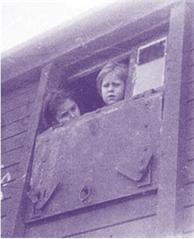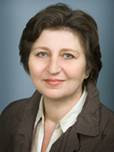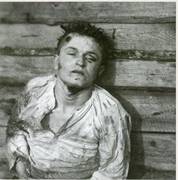
THE VOICE OF INTERNATIONAL LITHUANIA
|
VilNews has its own Google archive! Type a word in the above search box to find any article.
You can also follow us on Facebook. We have two different pages. Click to open and join.
|
Tue, 22nd December, 2015 - (17) Comment
in Palanga, West Lithuania

--Second row: - Zosė Ragauskaitė; Petrusė Bitkevičienė
--Third row: my father – Dr. Jonas Šliūpas
--Fourth row: –Pranas Ragauskas; Stasė Ragauskaitė;
my mother Grasilda Šliūpienė; Antanas Ragauskas
--Fifth row: – unknown person; Antanas Bitkevičius; Ričardas Estka.
Burlingame, California
- Bookmark :
- Digg
- del.icio.us
- Stumbleupon
- Redit it
Tue, 22nd December, 2015 - (1) Comment

“The tents were freezing cold, harsh, and distressing; so, the adults decided to build better living conditions. "We can build barracks," said one Lithuanian, "We can catch the logs in the Lena River." The men waded barefoot into the icy water, caught floating logs, brought them to shore, and built the barracks. They covered the outside walls with snow and ice which they learned would help keep out the frigid temperature. They also found a large iron stove, which they placed in the middle of the building.”
- Bookmark :
- Digg
- del.icio.us
- Stumbleupon
- Redit it
Tue, 22nd December, 2015 - (1) Comment
North Lithuania, year 1945
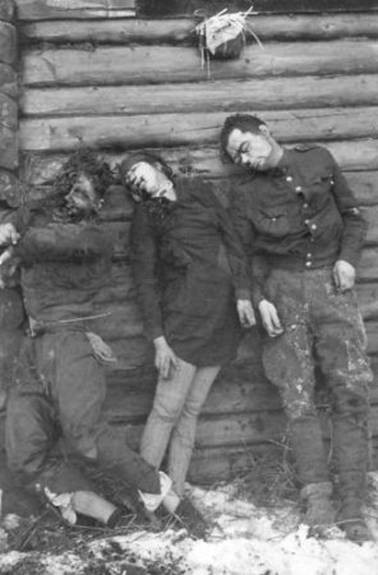
Christmas of 1945 is approaching a small farm on the outskirts of the village Šilagalis in northern Lithuania. It is the 22nd of December, and the mother in the house feels very happy that her 21-year-old son Povilas has finally come home for a visit, after being away for many months.
- Bookmark :
- Digg
- del.icio.us
- Stumbleupon
- Redit it
Tue, 22nd December, 2015 - (3) Comment

- Bookmark :
- Digg
- del.icio.us
- Stumbleupon
- Redit it
Mon, 21st December, 2015 - (0) Comment
But privately, in the homes Lithuanians were sticking to the proud traditions of Christmas from centuries back in time. Christmas Worship in churches was banned, so also the religious ceremonies took place at home in the families.
- Bookmark :
- Digg
- del.icio.us
- Stumbleupon
- Redit it
Mon, 21st December, 2015 - (3) Comment

time of the year...
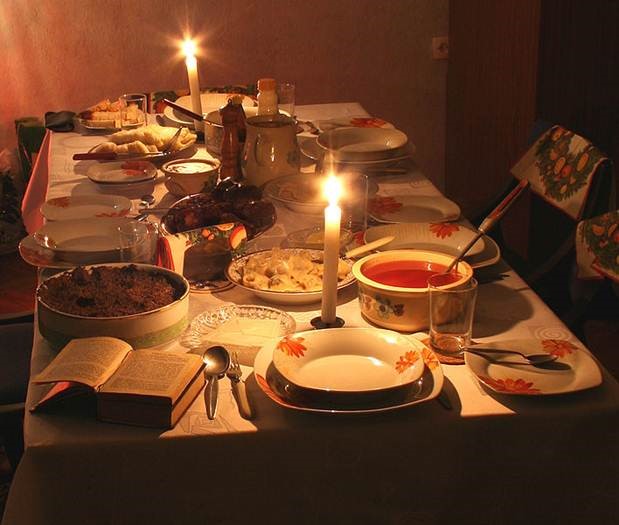
- Bookmark :
- Digg
- del.icio.us
- Stumbleupon
- Redit it
Fri, 20th November, 2015 - (4) Comment
2nd part: VilNews interview with
Professor Landsbergis, Veisaitė
 V. LANDSBERGIS IN STRASBOURG 1990 |
 SMUIKELĖ – V. LANDSBERGIS’ FAVOURITE PORTRAIT. BY R. PETROŠIŪTE FROM KELMĖ |

I. VEISAITE WITH HER DAUGHTER AND GRADCHILDREN
L/R: MICHAEL, ALINA AND DANIEL SLAVINSKY, 2011.
Journalist: Dalia Cidzikaitė
Questions prepared by Aage Myhre
Today we have the pleasure of presenting second last) part of a large, exclusive interview with two professors who have meant infinitely much for their homeland Lithuania. In today's interview, we focus on their memories, experiences of and thoughts about the BELOW eras of their lives, over the years 1950-2015:
· WHY IS STALIN STILL CONSIDERED A HERO BY MANY?
· THE LITHUANIAN PRESIDENT WHO WAS DEPORTED TO SIBERIA
· WAS LITHUANIAN PRESIDENT SMETONA
· MURDERED BY THE KGB?
· WHY DO LITHUANIANS ABROAD NOT RETURN HOME?
· DUAL CITIZENSHIP
· DID YOU KNOW EACH OTHER?
· LITHUANIA’S UNDERGROUND MOVEMENT DURING SOVIET TIMES
· HOW COULD THE LITHUANIAN COMMUNISTS
· GET BACK TO POWER ALREADY IN 1992?
· GEORGE SOROS AND A HUMANE DEVELOPMENT OF LITHUANIA
· DID YOU MEET VLADIMIR PUTIN FACE-TO-FACE?
· THE WORDS OF EINSTEIN
- Bookmark :
- Digg
- del.icio.us
- Stumbleupon
- Redit it
Fri, 13th November, 2015 - (2) Comment
Exclusive VilNews interview with Professor Landsbergis, Veisaitė
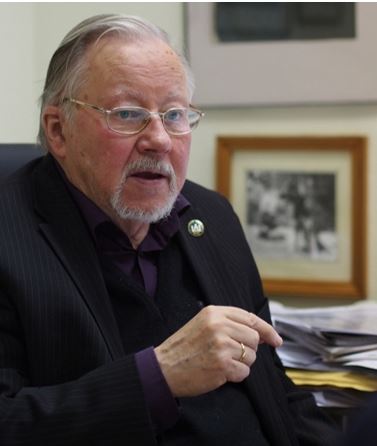 |
 |
PROFESSOR IRENA VEISAITĖ AND PROFESSOR VYTAUTAS LANDSBERGIS.
Photo: Patrick Murphy
Journalist: Dalia Cidzikaitė
Questions prepared by Aage Myhre
Today we have the pleasure of presenting a large, exclusive interview with two professors who have meant infinitely much for their homeland Lithuania. In today's interview, we focus on their memories, experiences of and thoughts about the following eras of their lives, over the years 1930-1960:
· CHILDHOOD IN KAUNAS, LITHUANIA’S INTERWAR CAPITAL
· MEMORIES OF ANTANAS SMETONA, LITHUANIA’S PRESIDENT 1926-1940
· PREWAR COMMUNISM IN LITHUANIA?
· ADOLF HITLER – NAZISM – PREWAR GERMANY
· TO BE A LITHUANIAN JEW (LITVAK) DURING WORLD WAR II
· THE LANDSBERGIS FAMILY RELATIONSHIP WITH JEWS
· LITHUANIA’S 9-YEAR BLOODY PARTISAN WAR AGAINST THE SOVIET UNION…
- Bookmark :
- Digg
- del.icio.us
- Stumbleupon
- Redit it
Fri, 13th November, 2015 - (0) Comment
Kaunas pictures from the 1930s

HAPPY EASTER 1938! FROM THE MAGAZINE "POLICE".
PHOTO: I.GIRČIO.…
- Bookmark :
- Digg
- del.icio.us
- Stumbleupon
- Redit it
Thu, 12th November, 2015 - (12) Comment
Lithuanian DPs
in Australia after WW2

DISPLACED PERSONS FROM LITHUANIA ARRIVING IN AUSTRALIA –
MRS LYDIA DRESCHERIS WITH HER CHILDREN AND A FRIEND
Image Copyright Western Australian Museum
By Jura Reilly
After World War Two Australia agreed to provide a haven for 170,000 refugees from war-torn Europe. This was the beginning of a large-scale immigration program undertaken by the Australian government, which felt that the population needed to grow so that the country could defend itself better, and have enough people to fill all the jobs that were available. Most of the refugees arrived during 1949 and 1950. Before WW2, more than 90% of Australians were from a British or Irish background. Presently, this proportion has dropped to approximately 80%. A total of 9906 Lithuanian DPs came to Australia between 1947 and 1953. In the 2011 Census, 13,594 adults acknowledged Lithuanian origins.…
- Bookmark :
- Digg
- del.icio.us
- Stumbleupon
- Redit it
Fri, 30th October, 2015 - (2) Comment
THIS ARTICLE, ABOUT THE HISTORY OF LITHUANIA, REACHED
ONE MILLION PERSONS AROUND THE WORLD IN ONLY ONE MONTH!
Lithuania – a country
you may think you know –
but do you really?
Text/research: Aage Myhre
We posted this article on one of our VilNews Facebook pages (www.facebook.com/VilNews) a few weeks ago. The article is about a seemingly 'boring' theme, namely the history of Lithuania.
But then it turns out that the article gets huge attention and reaches close to one million people worldwide in a matter of days. Probably never before have so many in such a short time been learning about the History of Lithuania!
For us who have worked with VilNews for many years this is yet another confirmation that Lithuania is of great interest to people around the globe if things are presented in attractive ways.

Did you know that Lithuania was a world super power – much longer than
USA has been – and Europe's largest country for more than 300 years
(1300-1600), stretching from the Baltic Sea to the Black Sea?
https://vilnews.com/2012-02-a-world-superpower-for-300-years
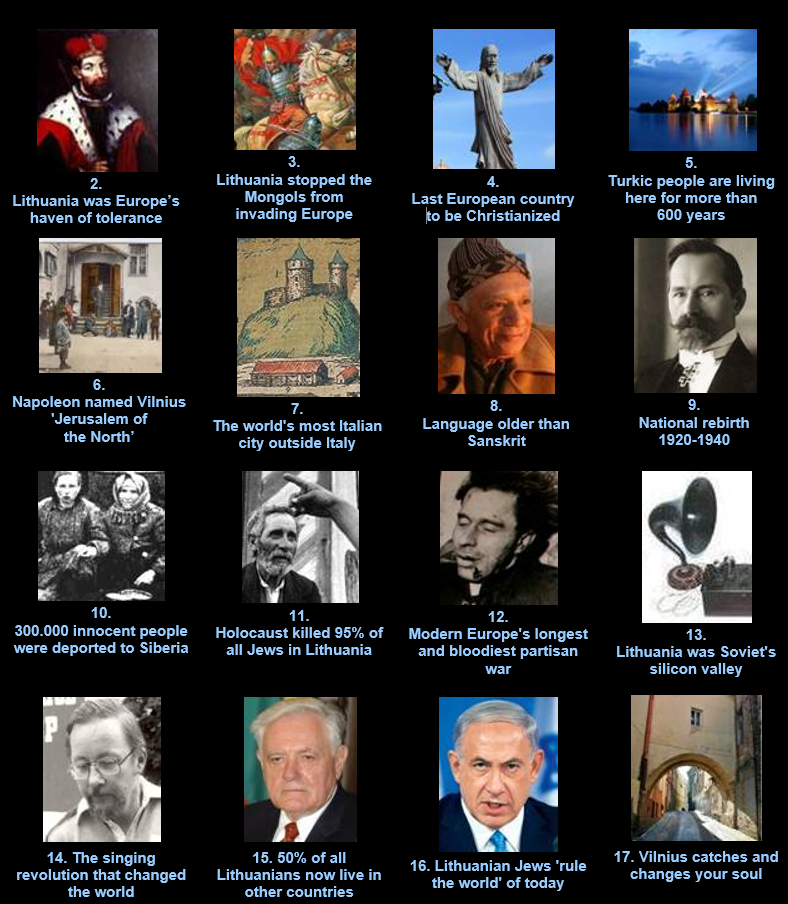
…
- Bookmark :
- Digg
- del.icio.us
- Stumbleupon
- Redit it
Sat, 4th May, 2013 - (6) Comment
King of Lithuania?
Prince Inigo von Urach is ready!
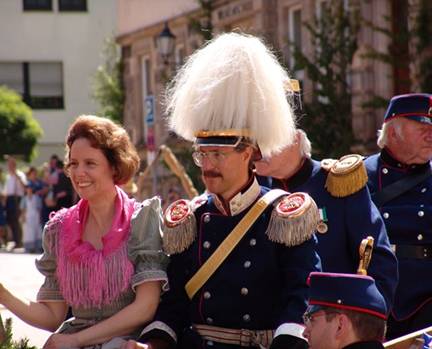
Prince Inigo of Urach, born 12 April 1962, with his wife –
Daniela Freiin von und zu Bodman, born 28 August 1963.
By Liudvikas Jakavičius-Grimalauskas
I am monarchist and I love to write about monarchy and nobility. I know that monarchy is not a topic that all people like, and that lot of people don’t want that monarchy returns to Lithuania. Personally, I think monarchy is the best form of government. If you research, 95% of the world monarchies are developed countries. But I respect all points of view, and also I can said that even if I prefer a monarchy to a republic, I am very satisfied with the work that our politicians have done, and I am very satisfied with the direction of our country. But, why do I think that this topic can be interesting for all Lithuanians? Because whether you like monarchy or not, this is part of our history, and Lithuanians like culture. So some people will like my points of views, and Prince Inigo von Urach views, and some will not. But the historical side of the article should be interesting for the majority of Lithuanians, whether they like monarchy or not.
Today Lithuania is a modern and dynamic North European nation of high technologies and innovations, with the second fastest growing economy in the European Union. But the territory that belongs to Lithuania has a large and old tradition as a Monarchy, tracing its political origins to 1219 as an independent Grand Duchy (The Grand Duchy of Lithuania), created by Mindaugas, a warrior who unified the territories that he conquered, proclaiming himself Grand Duke of Lithuania.
- Bookmark :
- Digg
- del.icio.us
- Stumbleupon
- Redit it
Does Lithuania’s royal history deserve more attention and respect?
Sat, 4th May, 2013 - (0) Comment

The Seal of King Mindaugas (1203-1263, reign 1251-1263) is a medieval
seal affixed to the October 1255 act by Mindaugas, King of Lithuania,
granting Selonia to the Teutonic Knights.
Historically, The Kingdom of Lithuania is rooted in the 13th Century when Mindaugas was crowned by Pope Innocent IV as King of Lithuania. Over the next five hundred years the storms of war and politics rendered its toll. Expansion and alliances with Poland and other nations, were not strong enough to keep the transformed Grand Duchy of Lithuania independent. In 1795 it was all but consumed by Russia.
After two centuries, in 1918 the strong will of the Lithuanian people gained independent statehood but this was also short lived. Twenty years of autonomy again ended with Russian and Nazi occupation.
Today’s Republic of Lithuania declared Independence (again) as a parliamentary democracy on March 11, 1990 and was internationally recognized in September 1991.
After the Freedom Declaration in 1918, there were many who wanted the monarchy reinstated in Lithuania. In 1990-1991 there was hardly anyone who dared to come up with such an idea. But today more and more people want attention to Lithuania's proud, royal history, and many believe the royal idea and past has wrongfully been swept under the rug ...
Here are some interesting articles, absolutely worth reading!
The trampling of Lithuania’s history
Restoring Lithuania's Royal Titles
Official site of His Imperial Majesty King Roman
King Roman of Lithuania sells titles from his house
- Bookmark :
- Digg
- del.icio.us
- Stumbleupon
- Redit it
Tue, 19th March, 2013 - (0) Comment
Gediminas’ Tower,
the symbol of Lithuania

Photos: Aage Myhre, March 2013
Gediminas' Tower (Lithuanian: Gedimino pilies bokštas) is the only remaining part of the Upper Castle in Vilnius, Lithuania.
The first fortifications were built of wood by Duke of the Grand Duchy of Lithuania, Gediminas. Later the first brick castle was completed in 1409 by Grand Duke Vytautas. Some remnants of the old castle have been restored, guided by archeological research.
It is possible to climb to the top of the hill on foot or by taking a funicular. The tower houses an exposition of archeological findings from the hill and the surrounding areas. It is also an excellent vantage point, from where the panorama of Vilnius' Old Town can be admired.
Gediminas' Tower is an important state and historic symbol of the city of Vilnius and of Lithuania itself. It is depicted on the national currency, the litas, and is mentioned in numerous Lithuanian patriotic poems and folk songs. The Flag of Lithuania was re-hoisted atop the tower on October 7, 1988, during the independence movement that was finalized by the Act of the Re-Establishment of the State of Lithuania on March 11, 1990.
- Bookmark :
- Digg
- del.icio.us
- Stumbleupon
- Redit it
Sat, 16th February, 2013 - (1) Comment
16 February 1918:
INDEPENDENCE!

The original 20 members of the Council of Lithuania
after signing the Act of February 16, 1918
RESOLUTION
The Council of Lithuania in its session of February 16, 1918 decided unanimously to address the governments of Russia, Germany, and other states with the following declaration:
The Council of Lithuania, as the sole representative of the Lithuanian nation, based on the recognized right to national self-determination, and on the Vilnius Conference's resolution of September 18–23, 1917, proclaims the restoration of the independent state of Lithuania, founded on democratic principles, with Vilnius as its capital, and declares the termination of all state ties which formerly bound this State to other nations. The Council of Lithuania also declares that the foundation of the Lithuanian State and its relations with other countries will be finally determined by the Constituent Assembly, to be convoked as soon as possible, elected democratically by all its inhabitants.
- Bookmark :
- Digg
- del.icio.us
- Stumbleupon
- Redit it
Sat, 16th February, 2013 - (1) Comment
Jonas Basanavičius
The patriarch of
Lithuania
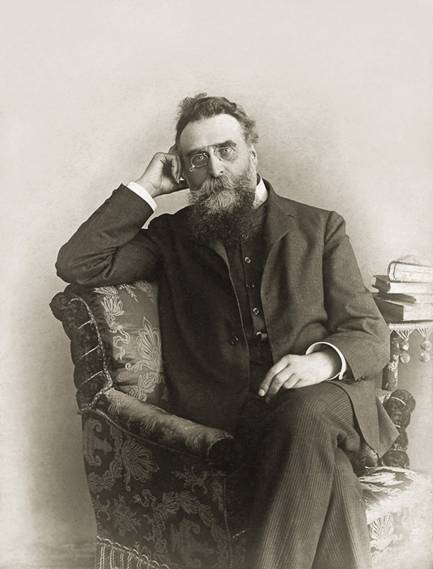
Jonas Basanavičius (23 November 1851 – 16 February 1927) was an activist and proponent of Lithuania's National Revival and founder of the first Lithuanian language newspaper Aušra. He was a signatory of the Act of Independence of Lithuania on 16 February 1918 Basanavičius is often given the unique informal honorific title of the "Patriarch of the Nation" for his contributions and help in re-establishing the Lithuanian state.
“A man's country is not a certain area of land, of mountains, rivers, and woods, but it is a principle; and patriotism is loyalty to that principle.”
- George William Curtis
It is 16 February 2013. It is today exactly 95 years since a group of brave men wrote the Lithuanian declaration of independence after the country had been under Tsarist Russia's iron heel through more than 100 years. These men represented a generation that certainly felt an overwhelming sense of pride at the dawn of renewed independence. The Act of February 16 was signed by all 20 representatives of the Council of Lithuania, proclaiming the restoration of an independent State of Lithuania, governed by democratic principles. The meeting and signing procedures were chaired by Jonas Basanavičius, the man often given the unique informal honorific title of the "Patriarch of the Nation" for his contributions and help in re-establishing the Lithuanian state.
What these men presented from the balcony of a house in Pilies street here in Vilnius Old Town was not much more than a piece of paper. But it was a paper that symbolized a nation willing to throw off the yoke.
A nation that had won back its self respect and dignity in spite of the injustice and oppression that had been going on since the Russian occupation started in 1795.
We salute these men for their courage and foresight. We salute them because they, in faith, hope and dignity clearly showed that Lithuania wanted to live up to its proud history as a nation of greatness.
Great nations are founded on self-belief!
- Bookmark :
- Digg
- del.icio.us
- Stumbleupon
- Redit it
VilNews e-magazine is published in Vilnius, Lithuania. Editor-in-Chief: Mr. Aage Myhre. Inquires to the editors: editor@VilNews.com.
Code of Ethics: See Section 2 – about VilNews. VilNews is not responsible for content on external links/web pages.
HOW TO ADVERTISE IN VILNEWS.
All content is copyrighted © 2011. UAB ‘VilNews’.

 Click on the buttons to open and read each of VilNews' 18 sub-sections
Click on the buttons to open and read each of VilNews' 18 sub-sections 

